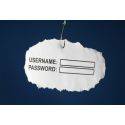Computerware Blog
4 Tips to Keep the Phish From Biting
The deep sea divers are always trying to loot your treasure, and if they are dedicated enough, nothing will stop them from getting what they want. These phishermen use all sorts of methods to electronically steal your valuable information, such as hoisting your passwords or credit card numbers. They do this through phony emails they've created, pop-up windows, and other sly measures that can catch literally anyone off guard. If you aren't careful, you might just wind up giving everything away in a personal information form that's not even real. They are extraordinarily difficult to distinguish from the real deal, and the phishers take advantage of this. Computerware is here to make sure you don't fall prey to these vile deeds.
It's Too Dark down Here!
Without an anglerfish to guide your way, you could walk right into an ambush and not even know it. Always tread carefully, especially when reading your email. Phishing attacks via email are the most common, so never reply to emails if you don't recognize the sender. Usually these predators get trapped in the spam folder, but once in a while one will get through, but. Computerware can provide you with an enterprise-level spam solution, a key component in your network firewall. Even if you have one of these, you should still be wary of anything requesting personal information via email. Look for subtle hints, such as lack of a signature or pixilated logos. Just delete spam emails, and never, ever, open them.
Stay Within Sight of Land
Unless the website is secure do not enter personal information into it (all secure sites will have a protocol of https://...). Many phishers will try and get you to visit a site that looks remarkably similar a to secure site, but it's created without encryption. This subterfuge lets hackers access any data you input, and they might even be able to take control of your computer!
Make X Not Mark the Spot
Unless you want to be robbed blind, don't share your personal information with a stranger, especially electronically. Hackers can access this data on route to its destination. In fact, it's a much better idea to just not send personal data electronically at all if you can help it. After all, data can be compromised, and you don't want to risk your entire company's future just to give your password to someone. A legitimate company will probably never try to get your information electronically, unless it is through an encrypted page on their official website.
Batten Down the Hatches
One of the better ways to protect yourself is to arm yourself with antivirus software and keeping it up to date. It will help you keep your data from being compromised and halt attempts at phishing out your personal information. It should be noted, however, that even the best measures taken are not guaranteed to stop an attack. It ultimately comes down to the PC user being careful not to get tricked into giving up any information. The best defense is to stay informed and to keep an eye out for any possible threats.
It's good to pay attention, but a backup plan will put your mind at ease knowing your data won't be completely lost if you fall for a trap. The Backup and Disaster Recovery device offered by Computerware is a perfect solution. Contact Computerware at (703) 821-8200 and you can rest easy knowing that we'll keep the phishermen at bay.


Comments